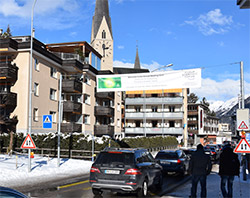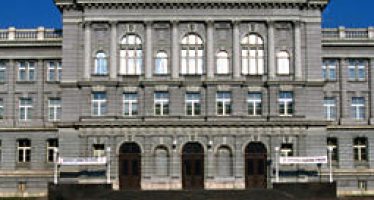World Economic Forum: Less Is More and Other Wisdom from Davos

Davos: World Economic Forum 2015. Photo: Copyright © CFI.co
Less is more, and you better get used to it. That is the message US real estate tycoon Jeff Greene brought to the World Economic Forum (WEF) in Davos, Switzerland. One of the hundred or so billionaires to attend the annual powwow of the world’s decision makers, Mr Greene warned that Americans’ lifestyle expectation are too high: “These need to be adjusted so we have less and smaller things. We need to reinvent our whole system of life.”
While this missive is echoed by others concerned about sustainability at the World Economic Forum, Mr Greene apparently does not think the prescribed standard of modest living applies to himself. He arrived in Switzerland with his family and two nannies aboard a private jet, fully enjoying the perks his $2.2bn fortune buys. Mr Greene claimed his fortune by trading credit default swaps and other exotic financial instruments in anticipation of a real estate market crash of 2008.
Later on Wednesday, Mr Greene met former UK Prime-Minister Tony Blair – now a consultant to questionable governments and big business and worth a mere $120m – for supper. On the first day of the Davos meet, Mr Blair delivered a talk on the rise religious extremism followed by a panel discussion. Though at the World Economic Forum in Davos, heckling is frowned upon if not strongly discouraged, Henning Zierock interrupted the proceedings by reminding Mr Blair of his own responsibility for the escalation of sectarian violence across the Middle East.
“Though at the World Economic Forum in Davos, heckling is frowned upon if not strongly discouraged, Henning Zierock interrupted the proceedings by reminding Mr Blair of his own responsibility for the escalation of sectarian violence across the Middle East.”
Mr Zierock presides over the German Culture of Peace Society and drew scattered applause with his intervention. Islamic scholar and panellist Hamza Yusuf Hanson agreed and went on to explain that regime change unleashes forces from within society that are almost impossible to control. “The first President Bush understood this and was fearful of creating a political vacuum in Iraq. However, the second Bush simply failed to grasp the enormity of his decision to replace the Iraqi government.”
Mr Blair defended the removal of Saddam Hussein from power, arguing that the dictator “wasn’t exactly a force for stability, peace, and prosperity for his country.” Mr Blair also pointed out that the regime of Saddam Hussein bore responsibility for the “killing of many hundreds of thousands of people.”
Political Backlash
In another WEF conference session, Paul Achleitner, chairman of the Supervisory Board of Deutsche Bank, revealed that the financial community had failed to anticipate the severity of the political backlash against their overreach. According to Mr Achleitner, the collapse in reputation suffered by the bankers possibly holds lessons for the tech giants such as Google and Facebook whose attempts at self-regulation may not be enough to quell growing opposition to their dominance: “Self-regulation, no matter what you do, is just not going to be good enough for tech companies.”
Google is currently facing an anti-trust probe by the European Commission while the European Parliament last month backed a motion that calls on regulators to consider breaking up the company. President Fadi Chehadé of the Internet Corporation for Assigned Names and Numbers (ICANN) – a not-for-profit organisation responsible for maintaining the unique identifiers that ensure the global network’s smooth operation – concurred and added that the public’s trust in technology companies is eroding fast: “Most tech leaders have been far too complacent about reputational risks.” Concerns about Internet surveillance by US security agencies, the dominance of US tech companies, and widespread corporate tax avoidance all conspire to fuel public misgivings.
PricewaterhouseCooper (PwC), one of the world’s Big Four auditors, yesterday released its annual survey of business leaders which is markedly less upbeat than the one presented at last year’s World Economic Forum. Worldwide, only 37% of the over 1,300 CEOs and entrepreneurs consulted expect economic growth rates to improve, down from 44% last year. Optimism has plummeted most in Russia. While most chief executives in 2014 had few doubts about the country’s excellent future prospects, the latest poll shows Russian CEOs downbeat.
Though the International Monetary Fund (IMF) revised its global growth forecast downwards from 3.8% to 3.5%, the fund’s Director of Research Olivier Blanchard said the drop in oil prices and the depreciation of both euro and yen will provide some solace. Calling the economic outlook for Russia “quite weak,” Mr Blanchard pointed at stagnation in Europe and Japan, or both, as the “most obvious risk” to the global economy.
A Lesson from Germany
UBS Chairman Alex Weber, formerly head of the Bundesbank, said in Davos that the quantitative easing (QE) package about to be unveiled by the European Central Bank (ECB) is “only part of the solution.” Mr Weber explained that as long as Eurozone member states fail to reform, questions about the viability of the euro will remain: “I think there will always be questions about viability of the project and Europe has not done enough to dispel these concerns.”
Mr Weber expects the ECB to announce a sizeable QE initiative but pointed out that the massive cash injection “only buys time for European policymakers to fix the issue.” The USB chairman called the structural reforms adopted along the periphery of the Eurozone – in countries such as Greece, Italy, Spain, and Portugal – “inadequate” and concluded: “Now Europe’s not back, the problems are back.”
Delivering a German take on developments, Mr Weber warned: “Policymakers shouldn’t kid themselves. They are in charge of reforms and if they don’t deliver reforms, they are not doing their job. The Eurozone needs to continue to work at integration and policymakers need to deliver policy reforms. If that doesn’t happen, the project of a single currency – which had benefits, very much so – becomes increasingly a difficult project to run.”
You may have an interest in also reading…
World Bank Group: Spurring Job Growth in the Western Balkans – Research and Innovation
By Paulo Correa and Christopher Colford Promoting economic growth and job creation requires innovative industries that can make imaginative use of business
Why an Expo 2020 Win Will Not Determine the Strength of Dubai’s Property Market
By Mat Green, Head of Research & Consultancy UAE, CBRE Middle East Property markets around the world have proven to
Johan Thijs and KBC’s Transformative Support of Werchter Boutique Festival
Under the leadership of CEO Johan Thijs, KBC Group has been a steadfast supporter of Belgium’s Werchter Boutique Festival, blending


















































































